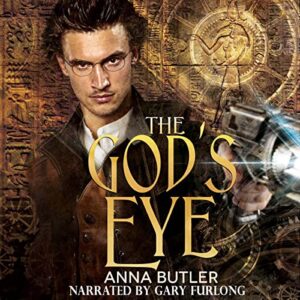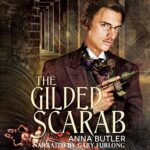Narrated by Gary Furlong
Note: The God’s Eye is the final book in a trilogy featuring the same central character and couple, and does not stand alone. There are spoilers in this review for the earlier books in the series.
The God’s Eye, book three in Anna Butler’s alt-Edwardian era/steampunk Lancaster’s Luck series, picks up somewhere over a year after the events at the end of The Jackal’s House. Those events were life-changing for Rafe, who, after realising that his cousin John had tried to have him killed – several times – then discovered the reason why: John knew that Rafe was actually his half-brother and the Stravaigor’s illegitimate son, and had got wind of the fact that the old man planned to disinherit him in Rafe’s favour. To say this was a bombshell is an understatement; Rafe has never wanted anything to do with house politics and has done his very best over the years to keep well out of them, but now, with the Stravaigor’s health failing and the futures of their hundreds of dependents and hangers-on in the balance, Rafe knows he has to step up and become First Heir of House Stravaigor. That isn’t to say he’s going to meekly accept his fate – ‘meekly’ and ‘Rafe Lancaster’ don’t belong in the same sentence! – but he’s determined to do things his own way, starting with his plans for the succession. His father wants him to marry Sofia Winter, younger sister of the First Heir of House Gallowglass (who happens to be Rafe’s lover, Ned); Rafe puts his foot down and refuses, saying his heir will be his as-yet-unconceived nephew, his half-sister Nell’s son. After, that is, Nell has found a suitable gentleman to marry.
One of the things I’ve really enjoyed about this series is that the author takes time to set the scene before kicking the plot into a higher gear. Here, we get to see something of Rafe’s relationship with the Stravaigor – which is complicated and not always cordial, as are Rafe’s feelings about the father he has just discovered and is about to lose – we meet Nell, who is a very spirited young woman, and see Rafe and Ned together, which really brings home just how close they now are and how solid they are as a couple, despite having to keep their romantic relationship a secret. Rafe’s change in status has made that relationship a little easier to conduct (as there’s no reason for anyone to question the association between two First Heirs) but heartache is on the horizon when he realises that the Stravaigor’s failing health means he won’t be able to accompany Ned on his annual archaeological expedition to Aegypt this year. The prospect of five months apart is hard to face, but Rafe has no alternative but to remain in Londinum while Ned heads off to his excavations without him. One small pinprick of light in the dark is the fact that the Gallowglass has access to the latest in Marconi technology, which means that Ned can keep in touch with home fairly easily. Rafe gets to speak to him occasionally, although of course, they can’t say what they really want to say to each other. Then, around Christmas time, Ned’s calls just… stop. The Gallowglass and Rafe learn that Ned, fascinated by the strange Antikythera mechanism (which actually exists and was discovered in 1901) and its potential links to the Egyptian god Thoth, has headed south into the remote, unexplored highlands of Abyssinia (now Ethiopia) – and has not returned. The Gallowglass – now a devastated father – asks Rafe if he will travel to Aegypt to find his son and bring him home.
From here on in, The God’s Eye turns into another rip-roaring adventure featuring a dashing hero and oodles of derring-do as Rafe heads to Aegypt on Ned’s trail and learns about a rival – German – team of archaeologists who are also trying to find the Antikythera machine. They believe it has the potential to become a deadly weapon and are determined to take it home to the Kaiser, so Rafe’s quest to find Ned also becomes a race against time to locate the artifact before their rivals do. I don’t think it’s a spoiler to say that Rafe and Ned are reunited – after which the plot thickens further as our heroes find themselves exploring a most unusual pyramid and learning more about the legends associated with Thoth, god of science, magic, art and judgment (among other things!)
Probably the best thing about this entire series is its central character. Rafe Lancaster is the best kind of anti-hero; he just wants to live a quiet life on his own terms, making wonderful coffee and spending time with friends, but when he’s thrust into the eye of the storm, he always rises to the challenge. He’s my favourite type of fictional hero – clever, brave, funny and whip-smart with a nice line in snark and self-deprecating humour who loves fiercely and is loyal to the death. His distinctive, engaging narrative voice is a huge reason I’ve enjoyed this series so much, and Gary Furlong’s portrayal of him is utter perfection and captures every facet of this complex, fascinating character. The only downside to Rafe’s being such a vibrant personality is that (as I said in my review of The Jackal’s House), Ned comes off as somewhat bland by comparison, although I do enjoy his archaeological geekery, and their obvious devotion to and love for one another is rather sweet. But by the time we get to this book, their relationship is a done deal, so there’s no real romantic development, just a confirmation of what we already know – that they’re in it for the long haul – and the adventure plot is the driving force of the story.
The worldbuilding here is as intricately detailed as ever and Anna Butler once again immerses the listener completely in the alt-turn-of-the-century steampunk world she has created, complete with fantastical technology, complex political systems and superbly envisioned locations and settings. As in the previous books, there’s a skilful dove-tailing of the real world with the fictional one, not only in the incorporation of the Antikythera machine, but also in the definite foreshadowing of war not too far down the road, with talk of the German Empire and its desire for expansion.
There’s a superbly-drawn secondary cast here, many of whom we’ve met before, such as Sam, Ned’s devoted bodyguard and Rafe’s former batman and good friend, Hugh, together with Albert Tatlock (I had to laugh – any Brit of my age will surely associate the name with the image of a jowly elderly gentleman in a flat cap frequently found in the Rover’s Return!) – whom the Stravaigor has assigned as Rafe’s protection. Rafe doesn’t like Tatlock and believes him to be more assassin than bodyguard, but as the story progresses, a grudging respect and liking begins to emerge between them and I enjoyed listening to that happening. We’ve met Nell briefly before, but she has a much larger role to play in this story (honestly, Rafe – I can’t believe you fell for it so easily!), as does Ned’s younger brother, Theo – who Ned always insists would make a far better Gallowglass than he is going to, seeing as how Theo is the one with the head for finance. Seeing the attraction slowly blooming between Nell and Theo definitely gives Rafe the hope that his plans for ensuring the succession of House Stravaigor will not be long in coming to fruition ;)
As is the case in the first two books in the trilogy, Gary Furlong turns in an absolutely magnificent performance, giving every cast member a distinct voice that fits their age, station and nationality, bringing a sense of real tenderness to the relationship between Rafe and Ned, conveying the underlying tension and hesitant affection lying between Rafe and the Stravaigor, and depicting the brother/sister teasing between Rafe and Nell with a deft touch. I’ve spoken about his outstanding portrayal of Rafe in other reviews, the way he captures his charm, his dry wit, his courage and his determination so perfectly – and all of that is true here, too. There are quite a few secondary characters, male and female, from many different parts of the world (Wales, France, Germany, America, North Africa as well as England) – so Mr. Furlong gets to exercise his facility with accents – and I especially liked his portrayal of Tatlock, his raspy, northern-accented tones and world-weary manner concealing a keen mind and dry sense of humour that sometimes peeks through in his interactions with Rafe.
With its fantastic worldbuilding, clever storytelling, high-stakes plots, memorable hero, and wonderful narration, the Lancaster’s Luck trilogy is a must for fans of historical action/adventure stories with a touch of romance. The God’s Eye brings this excellent trilogy to a resounding close, so if you haven’t started it yet, pick up The Gilded Scarab, get stuck in – and thank me later!
Caz
Buy The God's Eye by Anna Butler on Amazon





I’ve been tempted to pick up these audio books so many times, especially after your excellent reviews but am always put off because… “steam punk”. I’ve only listened to one steam punk and that was a few ago – it was an Alexis Hall and I didn’t enjoy it. Go on, tell me I’m wrong!
I haven’t actually listened to Prosperity (I’m guessing that’s the one?) but I suspect this series is totally different. The world building is on a par with CS Poe’s Magic & Steam books, although it’s England rather than NYC. The romance is quite low-key (and as I said in my review of book 1, Rafe does get involved with someone else before he settles with the love of his life) – but Rafe’s cynical, ironic narrative voice absolutely MAKES these books, and of course, GF is wonderful. They’re more like Boy’s Own Adventure yarns than epic romances, and the set up in the first book takes about half the book – but it’s SO well done and Gary is just so damn good as Rafe that you’re never bored. Seriously, don’t let the steampunk label put you off – this isn’t just any old story where the author lobs in a couple of steam carriages and airships to make it seem steampunk-y (as happened in a book I read recently) – Anna Butler cleverly makes her version of Victorian London very recognisable and different at the same time, and all the s/p tech is incredibly well integrated. Go listen to book one and then come back and thank me!! :P
I enjoyed The Guilded Scarab, but never picked up Book 2 for some reason. I’ll have to remedy that soon. The link to the Antikythera was fascinating! Thanks!